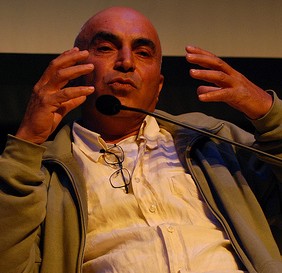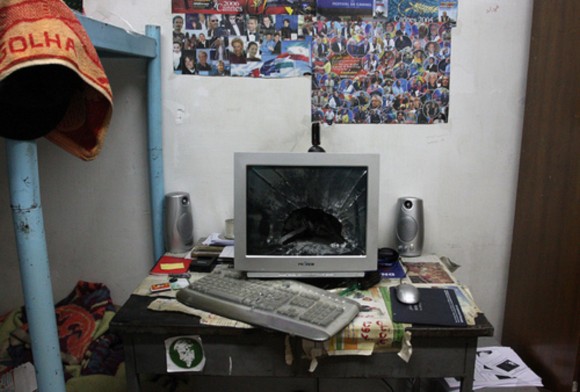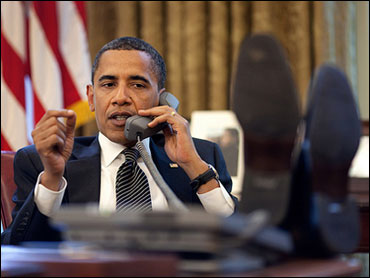Lebanese voters prevent Hizbollah takeover
By Robert Fisk, The Independent, June 8, 2009
There will be no Islamic Republic of Lebanon. Nor will there be a pro-Western Lebanese republic. There will, after yesterday’s vote – for the Hizbollah-Christian coalition and for the secular Sunni-Christian alliance – be a government of “national salvation” in Beirut, run by an ex-army general-president with ever-increasing powers.
Washington would have preferred that Saad Hariri, son of the assassinated ex-prime minister, came out with a clear win. But out of the shadows will come the same crippled, un-healable Lebanon; delightful, unworkable, poor old Lebanon, corrupt, beautiful, vanity-prone, intelligent, democratic – yes, definitely, democratic – and absolutely outside our powers to reform. [continued…]
March 14 bloc wins Lebanon election
Al Jazeera, June 8, 2009
Official results have confirmed the victory of Lebanon’s March 14 coalition over the opposition Hezbollah-led alliance in the country’s parliamentary elections.
Ziad Baroud, the interior minister, announced the figures on Monday, confirming what had already been predicted by the country’s newspapers.
The results showed the Sunni-led March 14 coalition, led by Saad Hariri, the son of Rafiq Hariri, the assassinated former prime minister, winning 71 seats in the 128-seat parliament, while the Hezbollah-led alliance took 57. [continued…]
— Even though there will not now be a Hezbollah-led government in Lebanon, the “Hezbollah lost” narrative is a bit misleading. All eleven Hezbollah candidates won their elections. It was Michel Aoun’s Christian party that lost — and thus Hezbollah lacks the coalition partner it would have needed to lead a new government — but since most Americans haven’t heard of Aoun, the media is much happier to ride with its favorite Islamists vs the West narrative. Add to that the “democracy wins” narrative and we can also expect to hear little about voting irregularities such as those The Guardian mentioned: widespread reports of vote-buying before the poll, with some Lebanese expatriates being offered free air tickets home. Just imagine the outcry if there had been any cases in which Hezbollah had been doling out hundreds of dollars to secure individual votes!
Report from Gaza: ‘We are a human experiment’
By Philip Weiss, Mondoweiss, June 7, 2009
A few days ago, I left Gaza with Medea Benjamin (above, as we came through the Sinai) and four other members of her Code Pink delegations. I wasn’t really able to write about Gaza while I was there. We had so many wrenching meetings and encounters over nine days that it was all I could do to drag myself back into my room at 1 in the morning and then rise at 6 or 7 the next day to begin the cycle again.
When I said that I was witnessing bondage out of the Bible, a friend I made in Gaza, Mond Mishal, a would-be graduate student, (right), shook his head. Mond
“Don’t talk about the bible, or an old story. You must find a new metaphor. We are being experimented on. This is a human experiment,” he said.
The other friend I made there, Reem Abu Jaber, echoed the point: “This is beyond books and fairytales. Sometimes I think that words are not made for what we are going through.” [continued…]
House hunting in the West Bank
By Gershom Gorenberg, The American Prospect, June 4, 2009
It’s Benjamin Netanyahu’s fault. Because of his insistence on allowing for “natural growth” of West Bank settlements, I decided to go real-estate shopping. I called Amana, the settlement-building organization, and said I was interested in homes in Binyamin, the name used by settlers and Israeli officialdom for the piece of the West Bank directly north of Jerusalem.
The sales rep was so helpful I could hear her smile. At Shilo, a 30-year-old settlement north of Ramallah, construction has recently begun on a new development. For about $160,000, she said, I could get a 1,200-square-foot house. To American ears, that sounds small, but for a Jerusalem apartment-dweller, it would be a step up. Besides, that’s a starter home; I could add a second floor now or later, she said.
At Eli, just up the road from Shilo, she offered homes in the center of the settlement and in outlying “neighborhoods.” In Hayovel, for instance, she had a house for $115,000, with a completed first floor and the outer shell for the second floor. She didn’t mention that the “neighborhood” of Hayovel is an illegal outpost, built partly on private Palestinian land. She offered me a similar house at a settlement called Ma’aleh Mikhmash. I thanked her and said I’d talk to my wife. [continued…]
What the new Jim Comey torture emails actually reveal
By Glen Greenwald, Salon, June 7, 2009
The New York Times was provided 3 extremely important internal Justice Department emails from April, 2005 (.pdf) — all written by then-Deputy Attorney General Jim Comey — which highlight how the Bush administration’s torture techniques became legally authorized by Bush lawyers. As Marcy Wheeler documents, the leak to the NYT was clearly from someone eager to defend Bush officials by suggesting that Comey’s emails prove that all DOJ lawyers — even those opposed to torture on policy grounds — agreed these techniques were legal, and the NYT reporters, Scott Shane and David Johnston, dutifully do the leakers’ bidding by misleadingly depicting the Comey emails as vindication for Bush/Cheney (Headline: “U.S. Lawyers Agreed on the Legality of Brutal Tactic”; First Paragraph: “When Justice Department lawyers engaged in a sharp internal debate in 2005 over brutal interrogation techniques, even some who believed that using tough tactics was a serious mistake agreed on a basic point: the methods themselves were legal”).
I defy anyone to read Comey’s 3 emails and walk away with that conclusion. Marcy has detailed many of the reasons the NYT article is so misleading, so I want to focus on what the Comey emails actually demonstrate about what these DOJ torture memos really are. The primary argument against prosecutions for Bush officials who ordered torture is that DOJ lawyers told the White House that these tactics were legal, and White House officials therefore had the right to rely on those legal opinions. The premise is that White House officials inquired in good faith with the DOJ about what they could and could not do under the law, and only ordered those tactics which the DOJ lawyers told them were legal. As these Comey emails prove, that simply is not what happened. [continued…]
Recently released Gitmo detainee talks to ABC News
By Jake Tapper, Karen Travers and Stephanie Z Smith, ABC News, June 8, 2009
For 7½ years, Lakhdar Boumediene was known simply by a number: “10005.”
These were the digits assigned to him when he arrived at the detention center at Guantanamo Bay, Cuba, swept up in a post-Sept. 11 dragnet and accused of plotting to blow up the U.S. and British Embassies in Sarajevo.
In an exclusive interview with ABC News, Boumediene said the interrogators at Gitmo never once asked him about this alleged plot, which he denied playing any part it.
“I’m a normal man,” said Boumediene, who at the time of his arrest worked for the Red Crescent, providing help to orphans and others in need. “I’m not a terrorist.”
The 43-year-old Algerian is now back with his wife and two daughters, a free man in France after a Republican judge found the evidence against Boumediene lacking. He is best known from the landmark Supreme Court case last year, Boumediene v. Bush, which said detainees have the right to challenge their detention in court.
That decision was a stunning rebuke of the Bush administration’s policies on terror suspects. It set up a ruling by District Court Judge Richard Leon, a former counsel to Republicans in Congress appointed to the bench by Bush, that there was no credible evidence to keep Boumediene detained.
After what Boumediene described as a 7½ year nightmare, he is now a free man. Boumediene: “I don’t think. I’m sure” about torture. [continued…]
America’s political paralysis over torture
By Alfred W. McCoy, TomDispatch, June 7, 2009
If, like me, you’ve been following America’s torture policies not just for the last few years, but for decades, you can’t help but experience that eerie feeling of déjà vu these days. With the departure of George W. Bush and Dick Cheney from Washington and the arrival of Barack Obama, it may just be back to the future when it comes to torture policy, a turn away from a dark, do-it-yourself ethos and a return to the outsourcing of torture that went on, with the support of both Democrats and Republicans, in the Cold War years.
Like Chile after the regime of General Augusto Pinochet or the Philippines after the dictatorship of Ferdinand Marcos, Washington after Bush is now trapped in the painful politics of impunity. Unlike anything our allies have experienced, however, for Washington, and so for the rest of us, this may prove a political crisis without end or exit.
Despite dozens of official inquiries in the five years since the Abu Ghraib photos first exposed our abuse of Iraqi detainees, the torture scandal continues to spread like a virus, infecting all who touch it, including now Obama himself. By embracing a specific methodology of torture, covertly developed by the CIA over decades using countless millions of taxpayer dollars and graphically revealed in those Iraqi prison photos, we have condemned ourselves to retreat from whatever promises might be made to end this sort of abuse and are instead already returning to a bipartisan consensus that made torture America’s secret weapon throughout the Cold War. [continued…]
TV debates electrify Iranian presidential campaign
By Michael Theodoulou, The National, June 8, 2009
Iran’s president, Mahmoud Ahmadinejad, has now traded bare-knuckled verbal blows with both of his reformist challengers in American-style live televised debates that have electrified the atmosphere before Thursday’s watershed elections.
On Saturday night he and Mehdi Karrubi, a septuagenarian former speaker of parliament, accused each other of corruption, scorned each other’s foreign policy and clashed over Iran’s troubled economy. Each swatted aside his opponent’s allegations as self-serving attempts to win votes.
Mr Ahmadinejad, 52, was left reeling against the ropes by an early body-blow from the white-bearded reformist, who is the only cleric among the four presidential contenders. Mr Karrubi mocked the president for claiming that a halo-like, celestial green light had descended on him when he addressed the UN General Assembly four years ago. World leaders were supposedly so transfixed by Mr Ahmadinejad that they sat unblinking – literally – for nearly 30 minutes as he spoke. The president’s opponents have long used the tale to portray him as a hallucinating zealot who appears to believe he is on a divine mission. [continued…]
In Iran, harsh talk as election nears
By Robert F Worth, New York Times, June 8, 2009
The leading candidates are accusing each other of corruption, bribery and torture. The wife of the strongest challenger to President Mahmoud Ahmadinejad has threatened to sue him for defaming her. And every night, parts of the capital become a screaming, honking bacchanal, with thousands of young men dancing and brawling in the streets until dawn.
The presidential campaign, now in its final week, has reached a level of passion and acrimony almost unheard-of in Iran.
In part, that appears to be because of a surge of energy in the campaign of Mir Hussein Moussavi, a reformist who is the leading contender to defeat Mr. Ahmadinejad in the election, set for Friday. Rallies for Mr. Moussavi have drawn tens of thousands of people in recent days, and a new unofficial poll suggests his support has markedly increased, with 54 percent of respondents saying they would vote for him compared with 39 percent for Mr. Ahmadinejad. [continued…]
A relative unknown leads challenge in Iran
By Thomas Erdbrink, Washington Post, June 8, 2009
The main challenger to President Mahmoud Ahmadinejad in Friday’s presidential election is a relatively unknown candidate who says he joined the race to save Iran from his opponent’s “destructive” policies.
Mir Hossein Mousavi, 67, who served as prime minister in the early years of the Islamic revolution, had stayed away from politics for the past 20 years. But he entered the race on a main promise to stand up to Ahmadinejad, which has earned him the support of influential clerics, politicians and young people alike.
Each night, tens of thousands of youths gather in Tehran’s main squares to cheer their support for a man who just a month ago they barely knew by name. Mousavi has emerged as the only serious alternative for those who oppose the policies of Ahmadinejad, who has the support a small group of hard-line clerics and some influential members of Iran’s Revolutionary Guard Corps. [continued…]
Why the Taliban won’t take over Pakistan
By Ben Arnoldy, Christian Science Monitor, June 7, 2009
It has become the statistic heard round the world. The Taliban are within 60 miles of Islamabad. Just 60 miles. Every dispatch about the insurgents’ recent advance into the Pakistani district of Buner carried the ominous number.
Washington quivered, too. A top counterinsurgency expert, David Kilcullen, reiterated that Pakistan could collapse within six months. Secretary of State Hillary Rodham Clinton said flatly if the country were to fall, the Taliban would have the “keys to the nuclear arsenal.” On a visit to Islamabad, Sen. John Kerry – the proctor of $7.5 billion in Pakistani aid as head of the Senate Foreign Relations Committee – warned bluntly: “The government has to ratchet up the urgency.”
The Pakistani military did launch a major counteroffensive that has sent 2 million people fleeing their homes. For now, both the US and many Pakistanis appear to be relieved that the military has drawn a line at least somewhere, in this case in the fruit orchards of the Swat Valley and the city of Mingora, north of Islamabad.
Yet Pakistani analysts and officials here caution that the casus belli of all the commotion – the infamous 60 miles and the threat of an imminent Taliban takeover – is overblown. The Visigoths are not about to overrun the gates of Rome. Bearded guys with fistfuls of AK-47s are not poised to breeze into Islamabad on the back of white Toyota pickups. [continued…]
Pakistan military campaign has broad support, but for how long?
By Alex Rodriguez, Los Angeles Times, June 7, 2009
Cradled in his father’s arms, 8-month-old Maaz Ayaz appeared listless and underweight.
A smudge of dirt marked the boy’s face. His father, Mohammed Ayaz, anxiously talked of how he and his wife could feed Maaz only tea and biscuits — the only food they could get their hands on at the refugee camp.
“We’ve asked for milk, but there’s none available,” Ayaz said. “We’re worried about our boy.”
Such moments of anguish abound at the Sheikh Yaseen camp in this chaotic, sun-baked city that has become the hub for Pakistanis fleeing the fighting in the Swat Valley, about 30 miles to the north.
Support for the military offensive against the Pakistani Taliban in the northwest has been widespread, cutting across economic and ethnic lines. But that support hinges precariously on how Pakistan manages the massive humanitarian crisis created by the war’s displacement of an estimated 3 million Pakistanis. [continued…]
 y name is Ezra Nawi. I am a Jewish citizen of Israel.
y name is Ezra Nawi. I am a Jewish citizen of Israel.

 he new American commander in Afghanistan has been given carte blanche to handpick a dream team of subordinates, including many Special Operations veterans, as he moves to carry out an ambitious new strategy that envisions stepped-up attacks on Taliban fighters and narcotics networks.
he new American commander in Afghanistan has been given carte blanche to handpick a dream team of subordinates, including many Special Operations veterans, as he moves to carry out an ambitious new strategy that envisions stepped-up attacks on Taliban fighters and narcotics networks. A photo released by the White House, which shows Obama talking on the phone with Netanyahu on Monday, speaks volumes: The president is seen with his legs up on the table, his face stern and his fist clenched, as though he were dictating to Netanyahu: “Listen up and write ‘Palestinian state’ a hundred times. That’s right, Palestine, with a P.” As an enthusiast of Muslim culture, Obama surely knows there is no greater insult in the Middle East than pointing the soles of one’s shoes at another person. Indeed, photos of other presidential phone calls depict Obama leaning on his desk, with his feet on the floor. [
A photo released by the White House, which shows Obama talking on the phone with Netanyahu on Monday, speaks volumes: The president is seen with his legs up on the table, his face stern and his fist clenched, as though he were dictating to Netanyahu: “Listen up and write ‘Palestinian state’ a hundred times. That’s right, Palestine, with a P.” As an enthusiast of Muslim culture, Obama surely knows there is no greater insult in the Middle East than pointing the soles of one’s shoes at another person. Indeed, photos of other presidential phone calls depict Obama leaning on his desk, with his feet on the floor. [